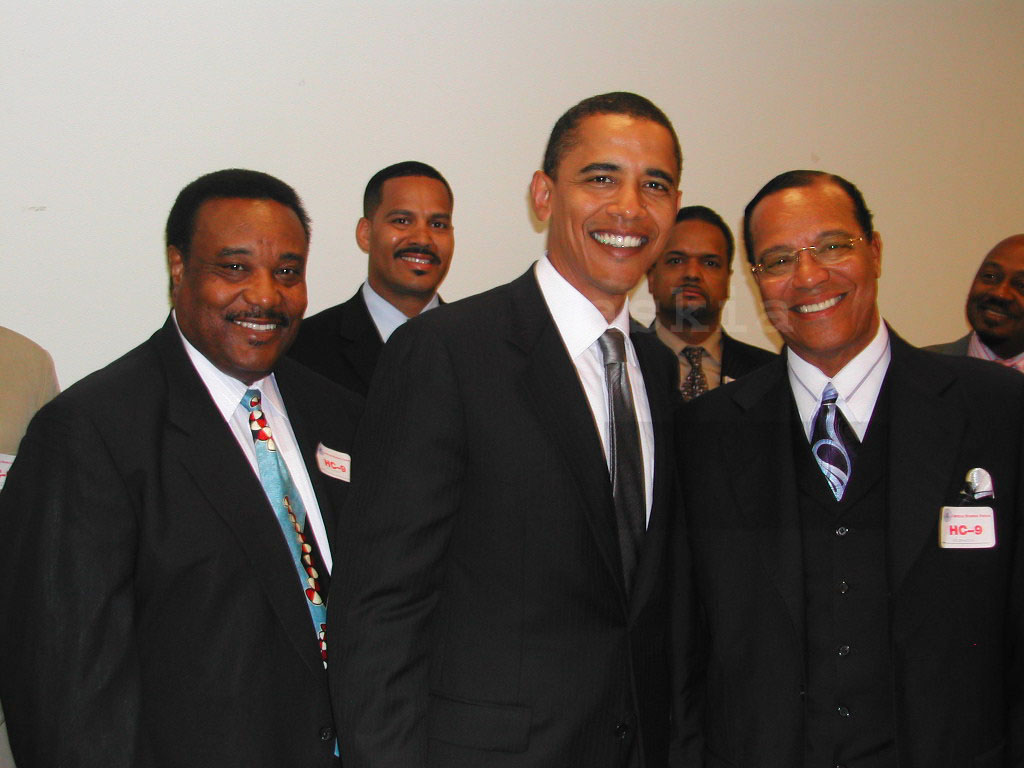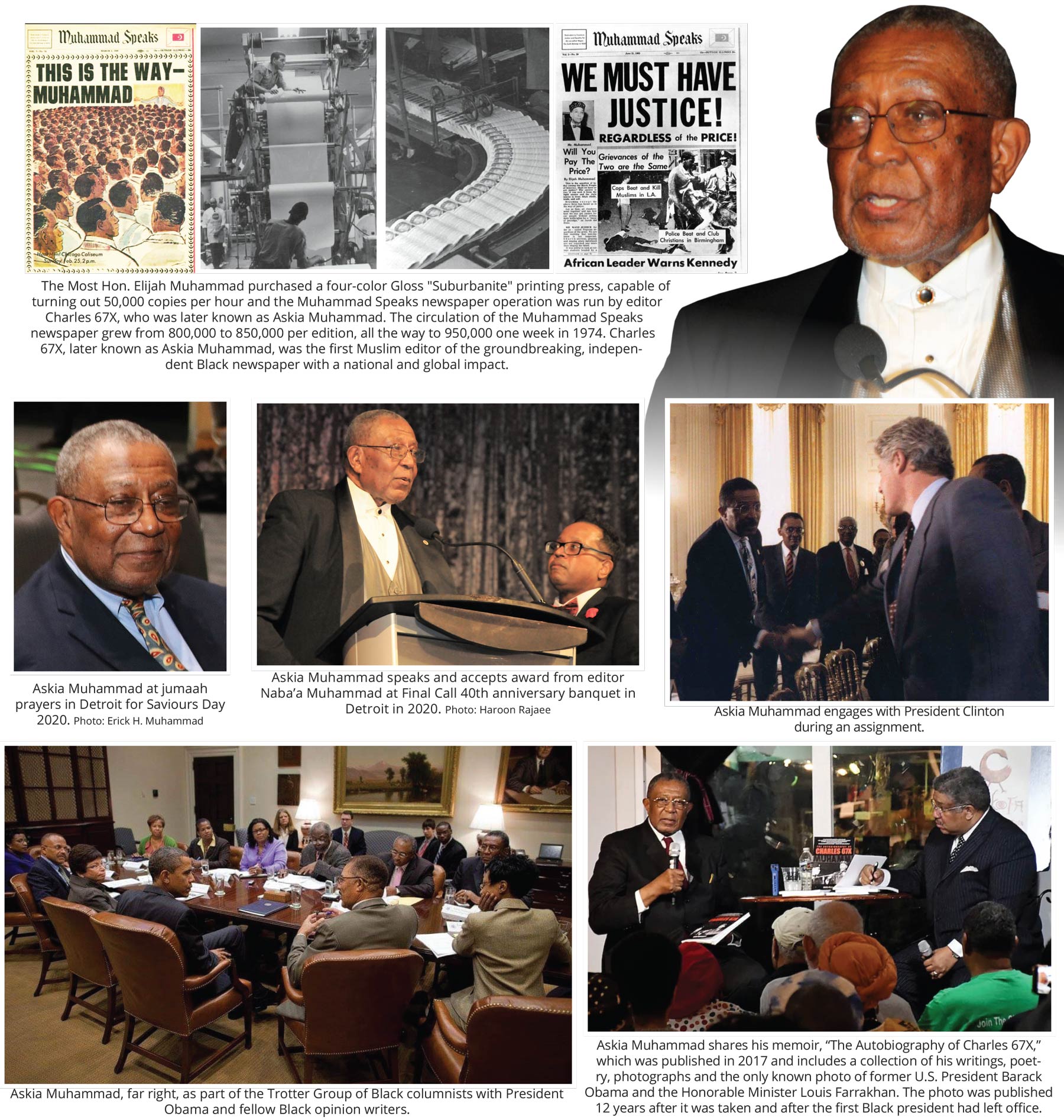When looking at a man’s life, sometimes it is the testimony and the words of those who loved him that speaks best to who he was.
But, in other instances, it is not the words of those who loved and understood him but those who perhaps didn’t understand him, didn’t agree with him but who were forced to respect him.
For the Black freedom fighter, the authentic respect given in tribute to the reality of who he was matters. So in the 1970s when Chicago Tribune writer Clarence Page, who is lauded in the world of mainstream journalism, wrote glowingly and truthfully of Charles 67X and Muhammad Speaks, the Nation of Islam’s legendary newspaper, and the Hon. Elijah Muhammad, it was a special witness bearing.
Charles 67X, the first Muslim editor of Muhammad Speaks, would become known as Askia Muhammad and would work “across platforms,” in radio, TV, print and photography before there was anything known as a platform.
Mainstream writer Page chronicled how the Muhammad Speaks was running and developing under the control of the Hon. Elijah Muhammad but under the execution of the Messenger’s editor, Brother Charles 67X. Muhammad Speaks was a bold and groundbreaking publication which proclaimed the mission, the message and the methodology of the Nation of Islam.
Muhammad Speaks chronicled the Black freedom struggle at home during the civil rights heyday, captured and presented the liberation struggle as the Black World threw off the yoke of Western imperialism and documented dying White World colonialism. Muhammad Speaks stands as a model and symbol of true independent Black journalism with the passion, the clarity, the courage and excellent execution of reporting and writing to enlighten and empower the masses of the people.

While the man later known as Askia Muhammad would serve as an intern at Newsweek magazine in 1968, as legal segregation and barriers were supposedly crumbling, he made a decision. He decided not to pursue the path of the Negro and assume a place as a cog in the master’s machine. He decided to break free. Refusing military service, he joined the Nation of Islam and put his talent and skill to work for the cause of freedom, justice and equality.
When the Honorable Minister Louis Farrakhan decided to rebuild the work of the Hon. Elijah Muhammad, a spiritual successor to Muhammad Speaks, The Final Call, was born in 1979. Askia Muhammad was an early editor. He had moved to Washington, D.C., where he provided work for The Chicago Defender, The Washington Informer and other Black newspapers, covered the White House, did radio reporting and production, hosted for WPFW-FM, and had his work featured by National Public Radio, The Washington Post and other major White-owned media.
He would travel to different parts of the world and cover international events, like the World Conference Against Racism, the African-African American Summits, and the World Friendship Tours embarked upon by Min. Farrakhan after the momentous 1995 Million Man March. He was a man, a Believer, a journalist. He forged his own path. When he was in the room with U.S. presidents, power brokers, politicians, movers and shakers or civil rights leaders, he commanded respect.
At his core was a deep self-love, self-respect and commitment to self-determination and Black progress. Why should one be content to lie on the floor and beg for scraps from the master’s table when one could create and set his own table? Askia Muhammad had seen that with the great success, despite great opposition, in the program and the international trade, the economic empire, and the freeing of Black minds, spirits and creativity through the Teachings of the Honorable Elijah Muhammad.
So he stood his ground, he fought his fights. He took his losses and he claimed no easy victories. He didn’t pander. He didn’t disrespect himself, hoping for some accolade or false honor. So when he was honored, and he was, he was honored for the man who he was, the ideals he represented and the life that he lived. Integrity. Commitment. Steadfastness. Militancy.
His attributes came through in his work, his words, his writing, his storytelling and his chronicle of Black life.
But rare are the times when a journalist, any journalist, captures a singular image of an historic moment that no one else has. Depending on the moment and the subject, a singular image becomes highly valuable, worth thousands of dollars and fame. There is but one publicly known image of former U.S. President Barack Obama and Min. Louis Farrakhan of the Nation of Islam. Think back to the vitriol and the controversy that erupted as the young Black senator from Illinois ran for the White House in 2008.
“Months later, as the political fortunes of Sen. Obama began to swell, he cast aside longtime pastor, the Reverend Jeremiah Wright, and there was a frenzy in the air to somehow tie Minister Farrakhan, the Muslim leader, to Senator Obama, the Black man who would be president,” wrote Askia Muhammad in his important book,
“The Autobiography of Charles 67X,” which he published in 2017. “The senator had both denounced and repudiated Minister Farrakhan, in his debates with Sen. Hillary Rodham Clinton, but there were the whispers that Barack Hussein Obama was secretly a Muslim, and any meeting with Louis Farrakhan would doom his candidacy,” he continued.
Can you imagine the value of a photo showing Obama and Farrakhan at that moment? Do you have any idea how much political operatives on all sides would have paid for such an image? Can you imagine how history would have changed if such an image had surfaced?
It didn’t. Not until 12 years later in “The Autobiography of Charles 67X,” was the photo of the Minister and Mr. Obama taken in 2005 at a Congressional Black Caucus meeting released. So Askia Muhammad’s integrity earned him a rightful place in history. We cherish his memory and we honor his example. Long live his spirit.














